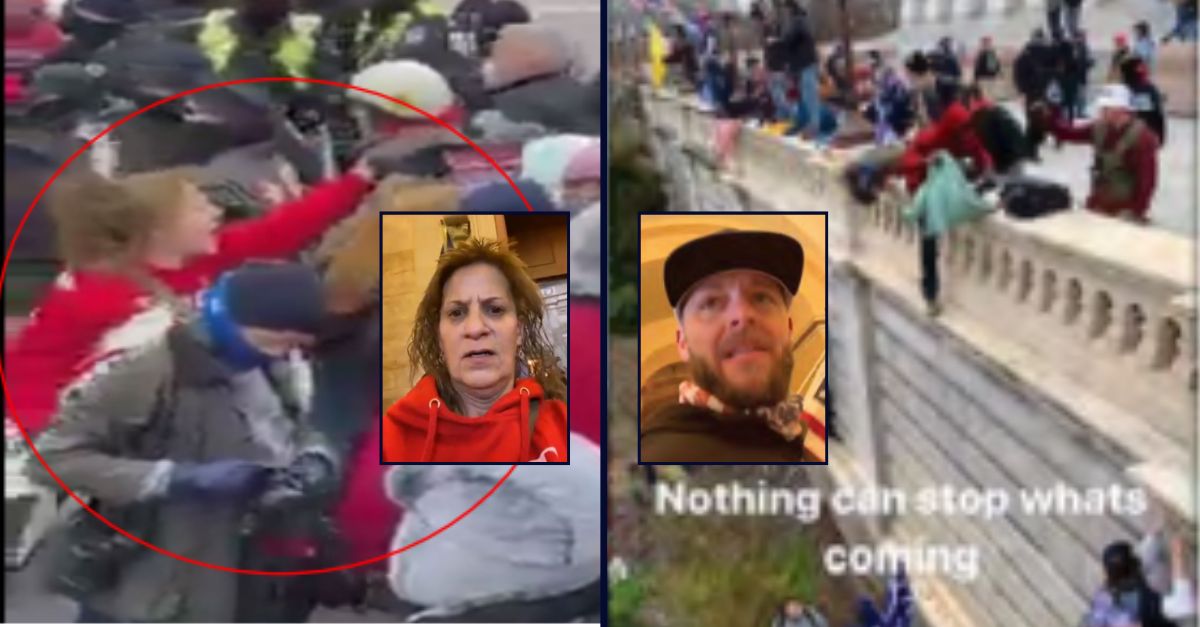
Left: Sandra Weyer. Right: Matthew Bledsoe. (Images from Jan. 6, 2021, via FBI court filings).
As a long-simmering legal confrontation threatens to wreak havoc on potentially hundreds of prosecutions over the Jan. 6 attack on the U.S. Capitol, two defendants have demanded they be released from prison until the nation’s highest court weighs in.
Late last year, the U.S. Supreme Court agreed to hear an appeal stemming from the federal government’s prosecution of Joseph Fischer, a Pennsylvania man who was convicted of obstructing an official proceeding of Congress — as well as other felonies and misdemeanors — in connection with the Capitol riot, when thousands of Donald Trump supporters descended on the building and violently breached its doors as Congress began to certify President Joe Biden’s win in the 2020 election.
According to federal prosecutors, Fischer, then a police officer with the North Cornwall Township Police Department in Pennsylvania, yelled “Charge!” before running toward a line of police officers at the Capitol that day. He is also alleged to have had a “physical encounter with at least one police officer.” Charges against him included civil disorder, assaulting police officers, trespassing and disorderly conduct — as well as the federal obstruction charge, which has been controversial since the start of the prosecutions stemming from the riot.
Defense lawyers have fought the obstruction charge against accused rioters for years, although it has been held up at nearly every legal turn: only one judge at the district level in Washington, D.C., found that it didn’t apply in Jan. 6 cases, and an appellate court affirmed the use of the charge in a split decision issued in April.
Now that the Supreme Court is set to hear the case, two filings from two separate defendants provide a preview of the chaos that will be unleashed if the current justices — three of whom were appointed by Trump himself — side with the former president’s supporters.
Sandra Weyer was convicted in June after a bench trial and sentenced in September to 14 months in prison. According to prosecutors, Weyer, who is from Pennsylvania, not only bragged about breaching the Capitol building but recorded herself taunting a New York Times photographer and kept recording as the photographer was violently assaulted and robbed by multiple rioters.
Matthew Bledsoe, of Tennessee, was convicted in July 2022 following a jury trial and in October 2022 was ordered to serve four years in prison. As Law&Crime previously reported, Bledsoe was seen scaling a wall of the Capitol building and entered through a fire door at the Senate Wing, where he climbed a statue.
Both of them were convicted of violating 18 U.S.C. § 1512(c)(2), obstruction of an official proceeding of Congress.
That statute reads, in relevant part, as follows:
(c) Whoever corruptly —
(1) alters, destroys, mutilates, or conceals a record, document, or other object, or attempts to do so, with the intent to impair the object’s integrity or availability for use in an official proceeding; or
(2) otherwise obstructs, influences, or impedes any official proceeding, or attempts to do so,
shall be fined under this title or imprisoned not more than 20 years, or both.
According to the Justice Department, more than 327 people accused in the Jan. 6 attack have been charged with the federal obstruction offense, which carries a potential 20-year prison sentence, and at least 92 have been convicted of it.
The question before the justices is whether the D.C. Circuit erred in construing the statute, “which prohibits obstruction of congressional inquiries and investigations[,] to include acts unrelated to investigations and evidence?”
Prosecutors have argued that while the enumerated offenses in the first subsection are specifically aimed at actions like destroying evidence, the second subsection, starting with the word “otherwise,” is meant to essentially be a “catchall” to address any other action, “corruptly” taken, to block “any official proceeding.”
Defendants have argued the statute is confined to actions such as destroying potentially incriminating documents, as consulting firm Arthur Anderson was found to have done on behalf of Enron as the then-crumbling energy company was going under, leading to what was then the largest corporate bankruptcy in the world.
Lawyers for both Bledsoe and Weyer — who have respectively appealed their clients’ cases — want their clients to be released ahead of the Supreme Court’s eventual ruling in the Fischer case. In Weyer’s case, her attorney says that she has proven not to be a flight risk — having been on pretrial release for more than two years without absconding — and that she was not charged with a violent offense.
Moreover, attorney Nicholas Smith — who also represents Fischer — argues, Weyer’s appeal raises a “substantial question” that could potentially result in her entire prison sentence being voided.
“Here, both the Court and the government have acknowledged, directly and indirectly, that the § 1512(c)(2) challenge posed by Weyer presents a substantial question, particularly in light of the certiorari grant in Fischer,” Weyer’s motion for release pending appeal says. “For example, in the Court of Appeals, the government has explicitly stated that Weyer’s is a substantial question … In addition, this Court recently stayed a Capitol riot defendant’s sentencing where his sole felony conviction was under § 1512(c).”
“If decided in Weyer’s favor, her appellate challenge to her Section 1512(c)(2) conviction would likely result in a reduced imprisonment sentence that would expire before her appeal concludes,” the filing adds.
Smith also says that if the obstruction charge is removed, Bledsoe would likely have received a significantly shorter prison term, if he was sentenced to time behind bars at all.
“The Supreme Court could very well decide the issue in question in the Fischer case in such a way that the Circuit will have to vacate the only felony count that Mr. Bledsoe was convicted on in this case,” attorney Jerry Ray Smith, Jr., argued in Bledsoe’s motion for release pending appeal. “This will require a reduction of his sentence that will likely cause it to end up being less than the time he has now already served.”
Bledsoe, like Weyer, is also not a flight risk, according to his lawyer. The Tennessee man was not only on pretrial release before his conviction, but he also self-reported for his yearslong prison sentence, Smith argues. Smith also says that the obstruction statute doesn’t apply to his client’s behavior on Jan. 6, and notes that if the Supreme Court agrees, the U.S. Circuit Court for the District of Columbia will have to follow suit.
Weyer has served around 45 days of her total sentence, while Bledsoe has been behind bars since December 2022.
Have a tip we should know? [email protected]

